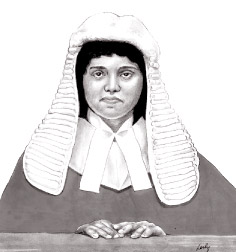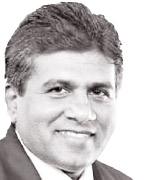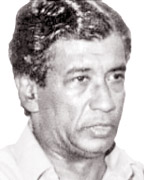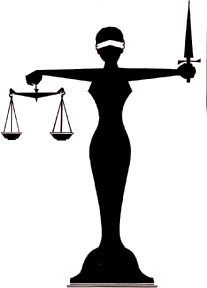Judges expose systemic failure in corrupt judiciary
H. L. D. Mahindapala
The anecdotal evidence, revealing what the judges are up to on the
bench,should have amused and, more importantly, shocked the Magistrates
and District Judges gathered at the Annual General Meeting of the
Judicial Services Association, (JSA)held on December 22, 2012. For
instance, Appeals Court Judge Justice A.W.A Salam speaking on the theme
of judges falling asleep on the bench while cases are in progress
confessed: “I also sometimes feel sleepy.
 I have my own way of doing it. When I’m quite alert, I just close my
eyes and wait. Suddenly, I open my eyes and, to show that I had followed
everything while my eyes were closed, I ask him a question! So even if I
fall asleep, he thinks I’m pretending to be asleep!” It is hilarious, no
doubt, but there is a flip side to this story:what is the impact of it
on the litigants who come in search of justice? The Chief Justice,
Shirani Bandaranayake, addressing the same audience said: "In 1867
Walter Bagehot commented that, the worst judge is a deaf judge." In this
story Justice Salam confirms that judges of our courts can not only be
deaf but also blind with sleep. I have my own way of doing it. When I’m quite alert, I just close my
eyes and wait. Suddenly, I open my eyes and, to show that I had followed
everything while my eyes were closed, I ask him a question! So even if I
fall asleep, he thinks I’m pretending to be asleep!” It is hilarious, no
doubt, but there is a flip side to this story:what is the impact of it
on the litigants who come in search of justice? The Chief Justice,
Shirani Bandaranayake, addressing the same audience said: "In 1867
Walter Bagehot commented that, the worst judge is a deaf judge." In this
story Justice Salam confirms that judges of our courts can not only be
deaf but also blind with sleep.
In fairness to Judge Salam it must be mentioned that he warned the
Judges to be attentive at all times. Nevertheless, this leaves room open
to question the fairness and the quality of justice meted out to
citizens who believe that they have come, in the words of the Chief
Justice, to their "Temple of Justice". Can judges who fall asleep on
their job deliver justice at the same time? Does this not amount to
deception of sorts?
However, it is the stories narrated by Justice C. V. Wigneswaran, in
his key note address, that revealed the seamy side of the judiciary.
There is one story that screams out for justice. In this story, believe
it or not, an innocent man was sent to prison because a Senior High
Court Judge didn't like the lawyer who appeared for him. The Judge knew
that there was hardly any evidence to convict the accused. So he put
words in the mouth of the accused and found him guilty. After that the
judge proceeded to give the maximum sentence to the client of his old
batch mate at Law College. This Judge has been recently appointed as a
High Court Judge.
Misconduct of crooked judges
Incredible? Yes. It's more than that. It's outrageous. Nay, it's
criminal. The story stinks to high heaven. It exposes the corruption of
the judicial/legal system that is now talking so piously about the
independence of the judiciary. Oddly enough,the gathering of the
magistrate and judges was focused on the theme of "the independence of
the judiciary". This anecdote goes to the heart of the ideal principles
enunciated by the legal pundits, from the Chief Justice downwards. The
general trend was to expand on the theme of independence of the
judiciary as if it is a mantra that should be chanted right now, in this
politically charged ethos, to glorify the judiciary.
But theme of corruption in the judiciary that ran as a counterpoint
was equally strident. While the high priests of legal morality were
intoning their principles lurid stories were told of how judges run amok
on the bench. It seemed as if principle were invoked to cover-up the
misconduct of crooked judges. No doubt independence is a sine qua non to
maintain the integrity, impartiality and the credibility of the judicial
system for the public to rely on its fairness to all. But what
confidence will it inspire in the public if the judges of the highest
court conduct themselves in the most vindictive fashion? How can a Judge
learned in the law act like abominable Prabhakaran? It is against all
known principles of human nature to send an innocent man to jail just to
please the bitter, vindictive cravings of a Judge.
Equally horrifying is the reaction of the entire legal profession
that listened to this story. Their indifference to the unjust
victimisation of an innocent man is deplorable. Normally, these acts
come from political institutions. But for the Judiciary to commit crimes
against innocent civilians is unpardonable. How can the highest tier of
the Judiciary listen to the plight of an innocent man imprisoned for no
fault of his own and not ask for an inquiry? Has the Chief Justice, who
was there, initiated an inquiry into the plight of this innocent man and
the conduct of the High Court Judge who was later promoted? Or are
judges above the law?
Team of black-coats
What has the Bar Association, headed by righteous Wijedasa Rajapakshe,
done so far? What does he propose to do, if anything all, in the future,
to prevent judges from going berserk on the bench? For how long will our
judges be allowed to pervert the judicial system to satisfy their sado-masochistic
tendencies? The just thing to do was to report his Law College batch
mate to the proper authorities -- the Bar Association, or Bribery
Commissioner, or the Judicial Service Commissioner, or the Chief
Justice. Instead of which the Judge punishes an innocent by giving him
the maximum punishment. Isn't this another case of black-coats, whether
on the bench or in the courts, ganging up to protect each other at the
expense of the innocent citizens? Will Wijedasa Rajapakshe lead another
team of black-coats to dash coconuts demanding justice/compensation for
this innocent man? Or will this unnamed innocent victim of a crooked
judicial system be ignored because he is not so important as the Chief
Justice?
The evidence in this case is unimpeachable because it came from a
retired judge who heard it straight from the vindictive Judge's mouth.
Here is the full story as narrated by Justice Wigneswaran to judges with
the Chief Justice listening:
|

Wijedasa Rajapakshe, PC |
|

Attorney-at-Law S. L. Gunasekera |
"There are other interesting cases of judicial bias. A senior High
Court Judge told me this about thirty years ago. This Judge had been
recently appointed a High Court Judge and sent to this station. A senior
lawyer who practiced in that Court had been a batch mate of the High
Court Judge at the Law College. The lawyer would daily come into the
Judge’s Chambers and wish him “Good Morning” and inquire about his
health and conveniences at the Official Bungalow, about his family,
children and so on. The Judge attributed the lawyer’s concerns to their
friendship at Law College until one day the Judge casually walked up to
the window overlooking the pathway within the Court’s premises. The
lawyer had just left after inquiring into the health and well being of
the Judge. Standing behind the curtain in his Chambers, the Judge
overheard the lawyer telling a client in Sinhalese “Work is done. I have
given the Judge’s dues. You will be acquitted. You must bring me extra
Rs.5000 before evening today after you are acquitted”! The Judge was
shocked. On looking into that day’s trial cases he found the one in
which his Law College friend appeared, there was hardly any evidence to
convict the accused. The lawyer knowing that the accused would be
acquitted had made use of the Judge’s name to make a fast buck.
Self-serving principles
"The Judge was furious. What did he do? He while hearing the case put
many matters into witnesses’ mouths, made out a case which was not there
and convicted the accused sentencing him with maximum punishment. I
inquired from him “Sir! Was it correct to punish the client for a
mistake made by the lawyer?” He said “May be you are right. But at that
time I was furious and until I convicted him I could not control my
anger. I refused permission to any lawyer thereafter to come into my
Chambers.” Judicial bias thus could be the outcome of anger and
annoyance."
It is the conclusion drawn by Justice Wigneswaran in his key note
address that is equally repugnant. He dismisses it as "judicial bias"
that comes out of "anger and annoyance." No, Sir! It is not simple as
that! It is a crime committed against an innocent man by a senior judge
of the Sri Lankan judiciary. Obviously, the judge told this to Justice
Wigneswaran to prove what a righteous man he was. A mature legal mind
trained in the highest principles of law and imbued with a sensitive
moral sense would have recognised instantly that the judge was a
hypocrite hiding behind his self-serving principles to boost his own
ego. Which moral judge would send an innocent man to jail to punish his
batch-mate at the Law College? The Judge lets the guilty party (his
batch-mate) go scot-free and sends an innocent man to jail just to prove
that he is a righteous man to his fellow-judge. Why should the helpless
accused pay for the the crime committed by his corrupt black-coated
friend? The duty of Justice Wigneswaran was to get his friend removed
from the bench for committing a heinous crime and the lawyer disbarred.
But he turns a blind eye to his fellow-judge's crime and also allows the
crooked lawyer to go on earning easy money through corrupt deals while
an innocent man languishes in jail. The law forced this victim to pay
twice: 1. he had to pay for the lawyer a bribe in addition to his fees
and 2. serve a jail sentence for a crime he never committed.
The Chief Justice addressed the same meeting that day. She was there
listening to this story and she and the entire legal profession
assembled at this august gathering of magistrates and judges had nothing
to say about the victimisation of an innocent man by a Judge of the Sri
Lankan courts. Besides, the story is now well publicized with Justice
Wigneswaran's speech going on the websites. This must be one of the
thousands of injustices committed by the bewigged judges. Neither the
President of the Bar Association, Wijedasa Rajapakshe, nor the Chief
Justice, Shirani Bandaranayake, who should have reacted instantly had
said anything about the conduct of the Judge or expressed any concern
about the victims of the Sri Lankan judiciary. Imagine a judge putting
words into the mouth of an innocent man deliberately to find him guilty
on a charge he had never committed and giving him the maximum prison
sentence! Does this judge deserve to sit even on a bench with a hole in
the middle in the village toilets?
 The narrator Justice Wignewaran too is an accomplice in this crime.
For thirty years he kept this crime to himself without reporting it to
the Judicial Commission or showing any compassion to the victim of his
fellow-judge's wrath. If he is the righteous man he claims to be his
first concern should have been to rescue the innocent victim locked up
in a jail for no reason at all. He knew that a grave injustice has been
done to an innocent man. He keeps his mouth closed all these days and
lets an innocent man rot in jail. He revealed this story to his brethren
in the judiciary not to right the wrong but to gloss over the act of a
fellow-judge who should be in jail instead of the innocent man whom he
convicted. The narrator Justice Wignewaran too is an accomplice in this crime.
For thirty years he kept this crime to himself without reporting it to
the Judicial Commission or showing any compassion to the victim of his
fellow-judge's wrath. If he is the righteous man he claims to be his
first concern should have been to rescue the innocent victim locked up
in a jail for no reason at all. He knew that a grave injustice has been
done to an innocent man. He keeps his mouth closed all these days and
lets an innocent man rot in jail. He revealed this story to his brethren
in the judiciary not to right the wrong but to gloss over the act of a
fellow-judge who should be in jail instead of the innocent man whom he
convicted.
This is not all. The stories he told in all makes you wonder whether
the judiciary has any right to claim independence. Here are the horror
stories he related to his brethren in the judiciary:
Horror stories
"Let me point out some of the common contributory causes, which lead
to judicial bias - Political pressures brought about directly or
indirectly. Desire on the part of a Judge to curry favour for his or her
future prospect. Pecuniary interest of the Judge in the subject matter
of the case before him or her. A desire to patronize any former
colleague at the Bar or elsewhere. Inherent tendency in a Judge to show
favour to certain classes of cases. Interest of the Judge in one or the
other litigating parties for any reason whatsoever. There are many more.
"A Judge needs to be alert with regard to his or her conditioned
reflexes when hearing a case. We are all human. But it would do us good
if we know ourselves – know our biases, prejudices, predilections and so
on. Inter alia gender bias, communal bias, racial bias and political
bias have been noticed in recent times.
"I know of a Lady Judge who would not seriously consider the need to
have corroborative evidence to support that of the complainant in a rape
case, regardless of how reliable the evidence was. I know of a Judge of
an Original Court who refused to read a judgment of the Supreme Court
produced in his Court by Counsel, which recommended corroborative
evidence to support the confession given by the accused in a case under
the Prevention of Terrorism (Special Provisions) Act with regard to the
actual happening of the event mentioned in the charge sheet.
"The principle there was, even if a confession might be considered to
have been voluntarily made, if the act confessed did not take place in
reality how could an accused be convicted. Since the Judge refused to
accommodate the Supreme Court Judgment in his anxiety to convict the
accused, the matter is now in appeal.
"A senior lawyer had played out several clients. While hearing the
criminal cases against him I had shown my disapproval of his conduct at
some stage. That was good enough for the accused and his lawyer to
say I was prejudiced and have the case transferred to another Judge
when in fact the lawyer’s cases were at their tail end after leading so
much of evidence. I was annoyed with the transferring authority for not
asking me anything or calling for my observations.
 I discussed this with Justice Jameel, who was then a High Court
Judge. He said “The fact that you are annoyed and angry confirms the
fear of the accused. What does it matter if a few cases are less for
you? Whether this lawyer will ultimately get convicted or not is not
your concern. You have done your part. Just leave it at that!” The
lawyer died soon thereafter – due to natural causes of course!" I discussed this with Justice Jameel, who was then a High Court
Judge. He said “The fact that you are annoyed and angry confirms the
fear of the accused. What does it matter if a few cases are less for
you? Whether this lawyer will ultimately get convicted or not is not
your concern. You have done your part. Just leave it at that!” The
lawyer died soon thereafter – due to natural causes of course!"
How can a judiciary that has lost its moral compass ask for
independence? Independence for what? To terrorise and imprison innocent
citizens?
Sordid practices at Hulftsdorp
Nevertheless, I must congratulate Justice Wigneswaran for his
no-holds-barred analysis of the judiciary. His first hand experiences
are more revealing than the doctoral theses of those in Law Faculties of
our universities. His analysis of the judiciary was clinical, sparing
neither the external nor the internal forces that threaten the
independence of the judiciary.
His candid narrative exposing the sordid practices at Hulftsdorp
reveals the systemic failures of the judiciary. He makes an attempt to
balance the external and internal factors fairly evenly even though at
the end he comes down heavily on the external (political) factors that
impact on the judiciary.
On the current crisis facing the Chief Justice he has taken a
cautiously critical stance. He concludes this aspect by saying : "And if
I may say so, honest reflection will show that the Judiciary played its
role in allowing this to happen." He also sounds a warning note: "As
Judges we must remember that manipulating crowds and processions are in
the domain of the political animal. Judges who, by virtue of their
office, are isolated cannot win that battle easily. The battle that can
be won of course is the battle in their domain – the legal domain."
His concluding words were: "You must continue performing your duties
however challenging they are, bearing in mind the need to be balanced.
You must continue to remain together, for you can be certain that there
will be moves to split asunder the unity. You must continue this
historic struggle for extrinsic independence. Not just for the judiciary
but for democracy."
Quite disappointingly, he did not sound the clarion call to clean up
the Augean stables at Hulftsdorp. Obviously, he is willing to brush
under the carpet the muck in which his black-coated colleagues wallow
and divert attention only to the external factors. If even one tenth of
what he says about Hulftsdorp is correct then there is an urgent need to
clean up the place from top to bottom. But we know that Justice
Wigneswaran is truthful. So will the Chief Justice and the President of
the Bar Association get together and initiate action to eradicate
corruption within the legal system?
The responsibility is mainly with the Chief Justice. She has heard it
all from the horse's mouth. She must have heard worst things on the
grape vine before and possibly kept quiet about it. But now that she has
heard it will she take it up with the Judicial Commission and the other
relevant authorities?
The role of some of the judges under her and her own role can
explain, to some extent,why the judiciary has fallen into the lower
depths described by Justice Wigneswaran. Her failure to clean up her
backyard is an indictment of her role as Chief Justice. As S. L.
Gunasekera, the intrepid legal luminary,said,quite aptly, she is "not
all Lily White". Her speech at this annual gathering of judicial
officers also reveals some aspects of her politics and attitude to the
law and the judiciary. Her speech will be examined in the next article. |







